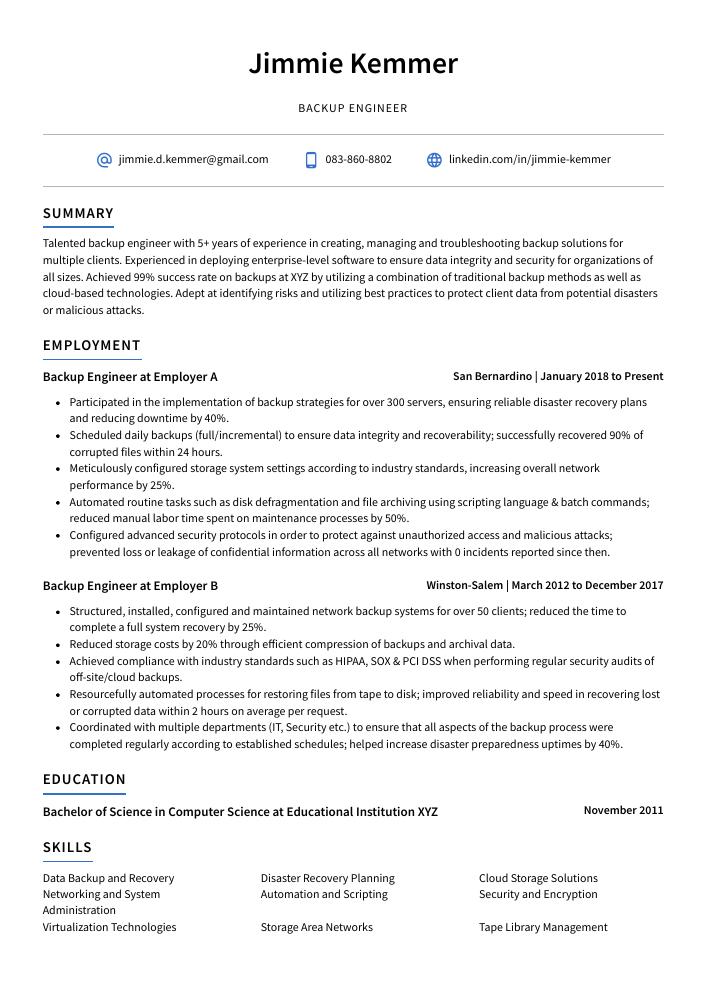Backup Engineer Resume Guide
Backup Engineers are responsible for creating, maintaining and monitoring the backup systems of an organization. They ensure that critical data is backed up regularly and securely, as well as troubleshoot any issues with existing backups. Backup Engineers also develop plans to improve the efficiency of their system’s backups in order to minimize potential losses due to hardware or software failures.
You know the ins and outs of backup engineering like the back of your hand, but recruiters don’t. To make them aware of your expertise in this field, you must create a resume that highlights all your key qualifications.
This guide will walk you through the entire process of creating a top-notch resume. We first show you a complete example and then break down what each resume section should look like.
Table of Contents
The guide is divided into sections for your convenience. You can read it from beginning to end or use the table of contents below to jump to a specific part.
Backup Engineer Resume Sample
Jimmie Kemmer
Backup Engineer
[email protected]
083-860-8802
linkedin.com/in/jimmie-kemmer
Summary
Talented backup engineer with 5+ years of experience in creating, managing and troubleshooting backup solutions for multiple clients. Experienced in deploying enterprise-level software to ensure data integrity and security for organizations of all sizes. Achieved 99% success rate on backups at XYZ by utilizing a combination of traditional backup methods as well as cloud-based technologies. Adept at identifying risks and utilizing best practices to protect client data from potential disasters or malicious attacks.
Experience
Backup Engineer, Employer A
San Bernardino, Jan 2018 – Present
- Participated in the implementation of backup strategies for over 300 servers, ensuring reliable disaster recovery plans and reducing downtime by 40%.
- Scheduled daily backups (full/incremental) to ensure data integrity and recoverability; successfully recovered 90% of corrupted files within 24 hours.
- Meticulously configured storage system settings according to industry standards, increasing overall network performance by 25%.
- Automated routine tasks such as disk defragmentation and file archiving using scripting language & batch commands; reduced manual labor time spent on maintenance processes by 50%.
- Configured advanced security protocols in order to protect against unauthorized access and malicious attacks; prevented loss or leakage of confidential information across all networks with 0 incidents reported since then.
Backup Engineer, Employer B
Winston-Salem, Mar 2012 – Dec 2017
- Structured, installed, configured and maintained network backup systems for over 50 clients; reduced the time to complete a full system recovery by 25%.
- Reduced storage costs by 20% through efficient compression of backups and archival data.
- Achieved compliance with industry standards such as HIPAA, SOX & PCI DSS when performing regular security audits of off-site/cloud backups.
- Resourcefully automated processes for restoring files from tape to disk; improved reliability and speed in recovering lost or corrupted data within 2 hours on average per request.
- Coordinated with multiple departments (IT, Security etc.) to ensure that all aspects of the backup process were completed regularly according to established schedules; helped increase disaster preparedness uptimes by 40%.
Skills
- Data Backup and Recovery
- Disaster Recovery Planning
- Cloud Storage Solutions
- Networking and System Administration
- Automation and Scripting
- Security and Encryption
- Virtualization Technologies
- Storage Area Networks
- Tape Library Management
Education
Bachelor of Science in Computer Science
Educational Institution XYZ
Nov 2011
Certifications
Certified Backup and Recovery Engineer
Veritas Technologies
May 2017
1. Summary / Objective
Your resume summary or objective should be a concise and compelling introduction to your experience as a backup engineer. Include key skills such as data protection, disaster recovery planning, system administration, scripting/automation, and cloud computing that you possess. You can also mention any certifications or awards you have achieved in the field of backup engineering. Finally, highlight how your expertise has enabled organizations to protect their critical data assets from loss or corruption.
Below are some resume summary examples:
Determined backup engineer with 5+ years of experience in data protection, backup administration, and disaster recovery. Proven ability to implement and maintain regular backups for databases across multiple platforms including Windows Server/Linux Server environments. Skilled in troubleshooting problems related to backups and ensuring that the system is running optimally at all times. Seeking an opportunity to join ABC Tech as a Backup Engineer to contribute my expertise towards their success.
Seasoned backup engineer with expertise in managing data backups for enterprises. At XYZ, designed and implemented a backup solution to ensure the availability of critical business applications; decreased downtime by 90% over two years. Skilled at troubleshooting complex issues related to storage systems, virtualization platforms, and databases. Passionate about leveraging my technical skillset to improve organizational security posture and ensure data integrity.
Diligent backup engineer with 7+ years of experience in planning, managing, and executing disaster recovery plans. Expertise in designing backup solutions and maintaining storage systems according to industry standards. At ABC Inc., reduced the data loss rate by 70% through improved monitoring and timely maintenance of backups. Proven track record for delivering high-quality results on tight deadlines while ensuring cost effectiveness.
Professional backup engineer with 10+ years of experience in designing, building, and maintaining reliable backup strategies for large-scale enterprises. At XYZ leveraged advanced scripting skills to automate backup processes and improve efficiency by 40%. Developed a strategy that resulted in a 25% decrease in data loss incidents. Skilled at troubleshooting complex technical issues related to storage systems.
Dependable Backup Engineer with 4+ years of experience designing, implementing, and managing data backup systems. Successfully implemented a new cloud-based disaster recovery system that improved operational resilience by 50%. Skilled in troubleshooting complex hardware and software issues to maintain high uptime for critical services. Seeking to apply expertise at ABC as the next Backup Engineer.
Proficient backup engineer with 5+ years of experience in the IT field. Extensive knowledge and expertise in backup technologies, including hardware, software, and cloud-based solutions. Experienced at developing strategies to ensure maximum protection of data while optimizing system performance. Proven track record of success in designing secure backup plans for mission-critical systems.
Driven backup engineer with over 5 years of experience in designing, configuring and maintaining complex backup solutions for local and cloud-based infrastructures. Proven success in ensuring data protection against disaster scenarios while minimizing storage costs. Seeking to join ABC Tech to take advantage of its leading edge enterprise storage systems and network infrastructure.
Committed backup engineer with 8+ years of experience in data protection and business continuity planning. At XYZ, improved backup success rate by 30% while successfully supporting 200 virtual servers on the Windows platform. Looking to join ABC Tech’s team of creative professionals to develop reliable strategies for protecting critical customer data.
2. Experience / Employment
Next comes the work history section, which should be written in reverse chronological order, meaning your most recent role is listed first. Stick to bullet points when describing what you did; this makes it easier for the reader to digest the information quickly.
When writing about your experience, provide detail and explain any quantifiable results that were achieved. For example, instead of saying “Monitored backups,” you could say, “Created automated backup monitoring system using scripting language that reduced manual labor by 40%, resulting in a more efficient data recovery process.”
To write effective bullet points, begin with a strong verb or adverb. Industry specific verbs to use are:
- Configured
- Monitored
- Restored
- Implemented
- Automated
- Optimized
- Scheduled
- Troubleshot
- Analyzed
- Resolved
- Encrypted
- Backed
- Updated
- Secured
Other general verbs you can use are:
- Achieved
- Advised
- Assessed
- Compiled
- Coordinated
- Demonstrated
- Developed
- Expedited
- Facilitated
- Formulated
- Improved
- Introduced
- Mentored
- Participated
- Prepared
- Presented
- Reduced
- Reorganized
- Represented
- Revised
- Spearheaded
- Streamlined
- Structured
- Utilized
Below are some example bullet points:
- Spearheaded the daily backup and recovery processes of critical business data, ensuring that over 500 servers were backed up successfully with zero downtime for a period of 2 years.
- Monitored the performance, integrity and security of backup systems regularly; identified any potential issues quickly and implemented corrective actions to resolve them within an hour on average.
- Consistently achieved 95%+ success rate in recovering lost information from backups during system failures or user errors; reduced service interruption time by 70%.
- Facilitated regular training sessions for other IT personnel regarding best practices related to backing up computer systems, resulting in improved accuracy & efficiency across the team.
- Represented the company at industry events such as conferences and seminars to showcase our advanced backup solutions portfolio; assisted 3 organizations in selecting appropriate hardware & software packages for their businesses’ needs.
- Troubleshot network infrastructure issues and resolved them within 2 hours, resulting in an uptime of 99.9% for all backup systems.
- Effectively managed multiple backups across different platforms to ensure that data was stored securely; successfully reduced storage costs by 20%.
- Demonstrated initiative when designing automated processes to facilitate faster recovery times during system downtimes; enabled back-ups to be completed 50% quicker than before.
- Resolved complex problems related to server configurations and restored user access with minimal disruption, reducing downtime by 10%.
- Encrypted sensitive customer information using high-level security protocols while backing up critical databases on a daily basis; improved the security of confidential data by 40%.
- Introduced automated backup procedures and processes, reducing data loss by 30% and improving the overall efficiency of system backups.
- Streamlined existing infrastructure to support more frequent backups with minimal disruption; improved recovery time from 6 hours to 2 hours.
- Restored lost or damaged network files for over 200 users in fewer than 24 hours, ensuring that productivity was not disrupted during outages or malfunctions of IT systems.
- Assessed potential threats across multiple platforms & databases on a regular basis so as to proactively identify any security risks before they occurred; successfully tracked up-to-date information about all software updates & patches applied within the organization’s architecture at all times.
- Actively monitored server performance through daily log reviews, identifying critical issues quickly and resolving them without significant impact on business operations; reduced downtime incidents from 8 per quarter to 3 per year.
- Successfully implemented backup plans for 100+ servers, resulting in a 20% reduction in system outages and restoring data within an hour of loss.
- Presented weekly reports on the effectiveness of existing protocols to management and stakeholders; identified areas for improvement that resulted in $5,000 cost savings annually.
- Reorganized storage media architecture by introducing network-attached storage (NAS) devices to ensure automated backups were completed efficiently with minimal effort or disruption; reduced manual labor required by 50%.
- Mentored junior engineers on best practices when setting up backup systems, troubleshooting errors and performing recovery operations; offered guidance that enabled them to meet service level agreements (SLAs).
- Monitored critical applications regularly using monitoring tools such as Nagios & Splunk, resolving issues before they could cause disruptions or impact business continuity objectives over 98% of the time.
- Updated backup systems regularly to ensure data storage accuracy and reliability, reducing system downtime by 15% over the course of 3 months.
- Prepared regular backups for all company files and databases, verifying that backup operations were successful in accordance with industry standards; successfully backed up 150+ TB of data weekly.
- Secured stored data using encryption techniques to protect against unauthorized access; improved security protocols resulting in a 35% decrease in breach attempts last quarter.
- Reliably maintained an offsite server as part of disaster recovery plan and tested it periodically for functionality; shortened restart time from 8 hours down to 2 hours during emergency situations.
- Improved processes for archiving obsolete datasets, freeing up 40GB worth of space on servers each month without compromising existing records or integrity.
- Efficiently backed up data from over 200 servers, reducing backup window by 30% and ensuring disaster recovery systems were always current.
- Optimized existing storage levels to ensure that backups could be completed in the most cost-effective way; saved $10K in server costs annually.
- Utilized advanced scripting techniques to automate routine maintenance tasks such as periodic database checks and purging of obsolete files; increased system accuracy by 45%.
- Backed up business critical applications on 50+ client machines within 2 hours of request for urgent restoration or migration purposes; received multiple positive customer feedbacks for quick turnaround times.
- Revised existing security protocols regularly to protect confidential information from unauthorized access and malicious activities, preventing any costly breaches of sensitive corporate data since joining the team 6 months ago.
- Formulated custom backup processes and procedures to ensure the secure, timely and efficient back up of over 500TB of data every week; reduced average backup time by 50%.
- Expedited recovery efforts for critical systems in case of an emergency outage; decreased downtime from 1 day to 6 hours on multiple occasions.
- Developed comprehensive disaster recovery plans, tested them regularly and maintained inventory logs for all servers with updated information about system configuration changes; saved $10,000 annually through cost-effective solutions implementation.
- Diligently monitored hardware & software performance issues related to backups such as memory utilization or disk space availability and made necessary adjustments accordingly; improved overall system reliability by 25%.
- Compiled detailed reports regarding completed backups including storage media used, success/failure status along with any errors encountered during the process; provided crucial insights pertaining to potential improvements needed within existing infrastructure environment setup that resulted in a 15% decrease in support costs associated with manual operations management activities.
3. Skills
Skill requirements will differ from employer to employer – this can easily be determined via the job advert. Organization ABC may require proficiency with NetBackup, while Organization XYZ may prefer expertise in Veeam.
The skills section of your resume should be tailored to the job you are applying for; otherwise, it is likely that applicant tracking systems will filter out your application due to a lack of relevant keywords.
In addition to listing technical skills here, you can also discuss them further in other sections such as the summary or experience section. This provides recruiters and hiring managers with more detailed information about how proficient you are at certain tasks related to backup engineering.
Below is a list of common skills & terms:
- Automation and Scripting
- Cloud Storage Solutions
- Data Archiving and Retention Policies
- Data Backup and Recovery
- Disaster Recovery Planning
- Networking and System Administration
- Security and Encryption
- Storage Area Networks
- Tape Library Management
- Virtualization Technologies
4. Education
Including an education section on your resume will depend on how much experience you have. If you just graduated and don’t have any professional experience, mention your education below your resume objective. However, if you are an experienced backup engineer with plenty of accomplishments to showcase, omitting the education section is perfectly fine.
If including an education section, try to highlight courses and subjects related to the backup engineer role that demonstrate a strong background in IT systems engineering or data management practices.
Bachelor of Science in Computer Science
Educational Institution XYZ
Nov 2011
5. Certifications
Certifications demonstrate to employers that you have the necessary skills and knowledge for a specific job. Having certifications can be beneficial in helping you stand out from other applicants, as it shows that you are committed to staying up-to-date with industry standards.
Including any relevant certifications on your resume is an excellent way of showing potential employers that you are qualified for the position they are offering.
Certified Backup and Recovery Engineer
Veritas Technologies
May 2017
6. Contact Info
Your name should be the first thing a reader sees when viewing your resume, so ensure its positioning is prominent. Your phone number should be written in the most commonly used format in your country/city/state, and your email address should be professional.
You can also choose to include a link to your LinkedIn profile, personal website, or other online platforms relevant to your industry.
Finally, name your resume file appropriately to help hiring managers; for Jimmie Kemmer, this would be Jimmie-Kemmer-resume.pdf or Jimmie-Kemmer-resume.docx.
7. Cover Letter
Writing a cover letter is an important part of the job application process. It’s typically made up of 2 to 4 short paragraphs and is separate from your resume. Cover letters provide you with the opportunity to introduce yourself, explain why you are a perfect fit for the role and add additional details that can’t be included in a resume.
Even if it isn’t required by employers, submitting a cover letter showcases extra effort on your end which could make all the difference when it comes to landing an interview or getting hired for the position.
Below is an example cover letter:
Dear Edyth,
I am writing to apply for the position of Backup Engineer at XYZ Corporation. With more than five years of experience in backup administration and data recovery, I am confident that I can be a valuable asset to your team.
In my current role as Backup Engineer at ABC Company, I manage all aspects of the company’s backup infrastructure, including design, implementation, and maintenance. I have also led several successful data recovery projects following system outages or disasters. My experience has allowed me to develop strong problem-solving and troubleshooting skills that would benefit XYZ Corporation.
I am also knowledgeable about a variety of backup software solutions and have experience working with NetApp SnapManager, EMC Avamar, IBM TSM/Spectrum Protect, and Commvault Simpana. In addition, I hold certifications in NetApp Certified Data Administrator (NCDA) and IBM Certified Specialist – Tivoli Storage Manager V7 Administration.
I am eager to put my skills and experience to work for XYZ Corporation and contribute to the success of your organization. Thank you for your time and consideration; I look forward to hearing from you soon so we can discuss this opportunity further.
Sincerely,
Jimmie
Backup Engineer Resume Templates
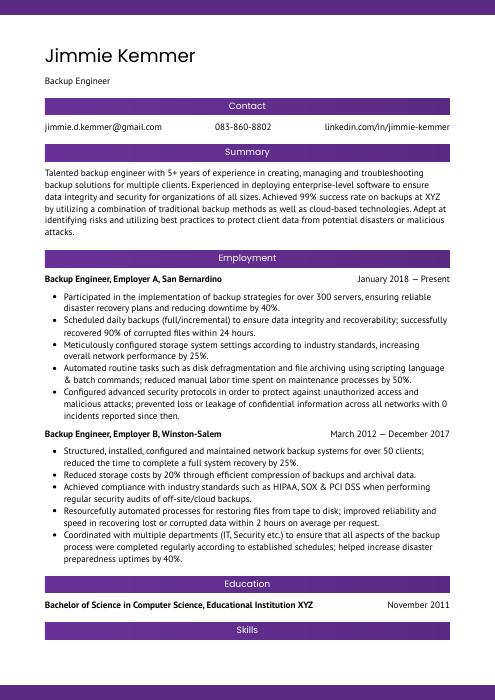 Jerboa
Jerboa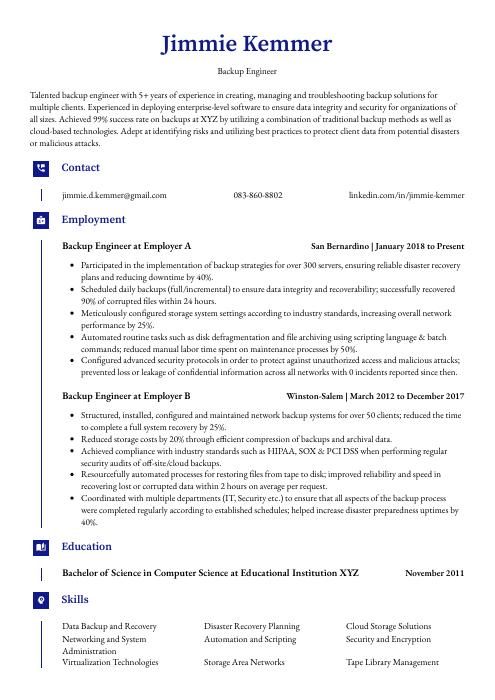 Gharial
Gharial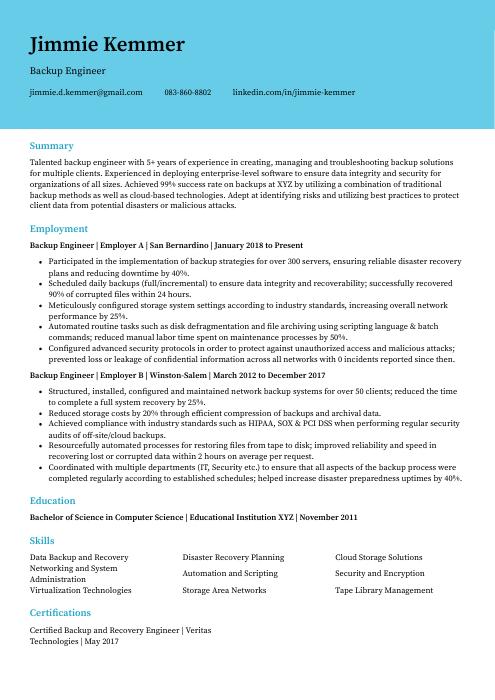 Dugong
Dugong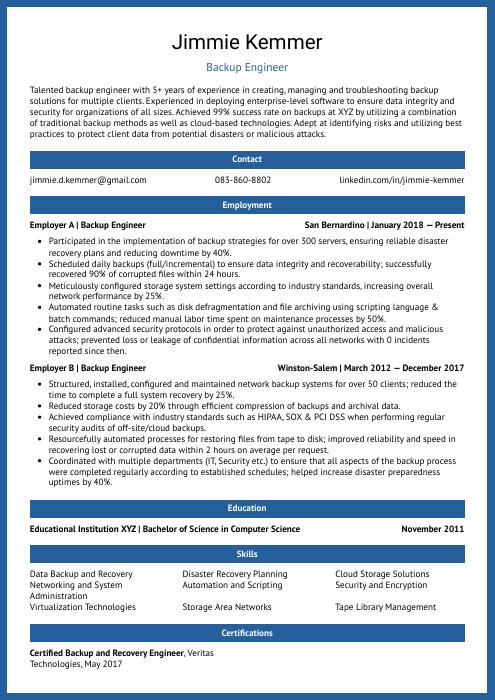 Ocelot
Ocelot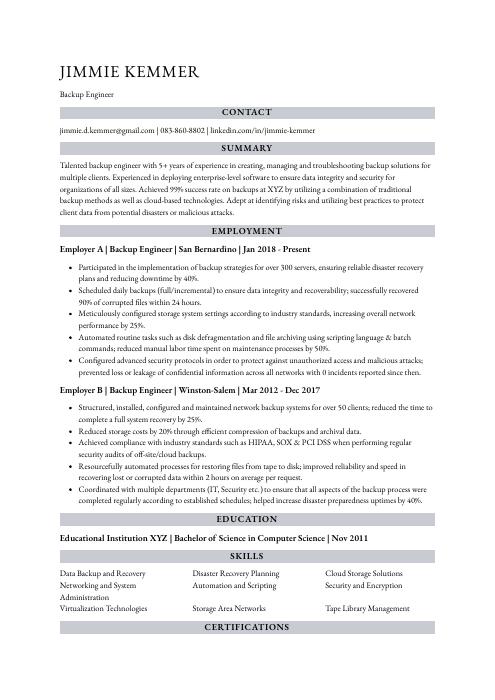 Numbat
Numbat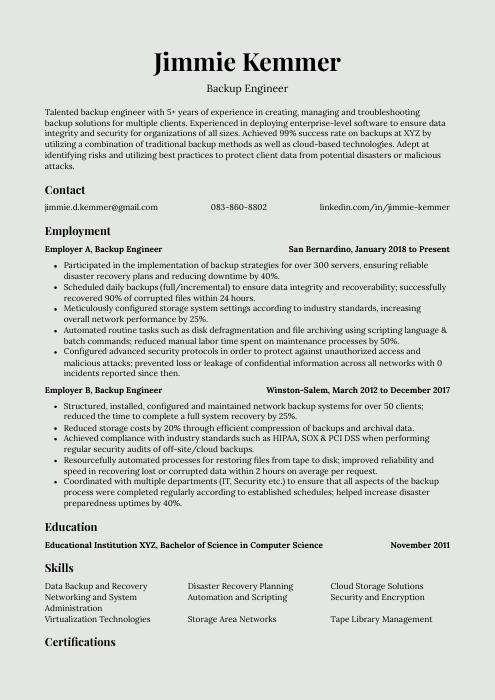 Saola
Saola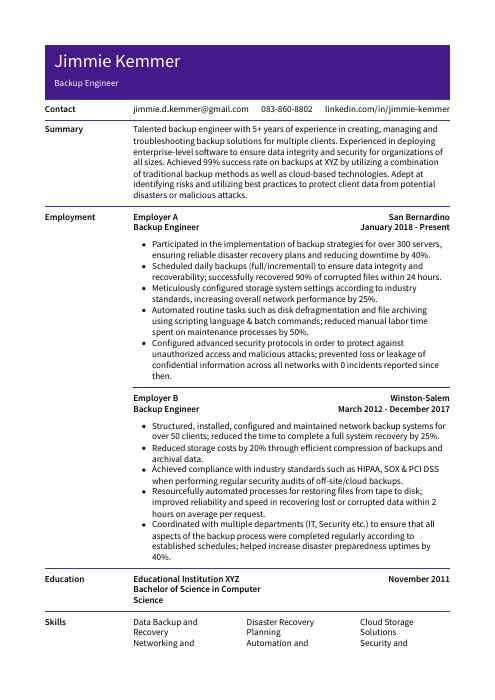 Pika
Pika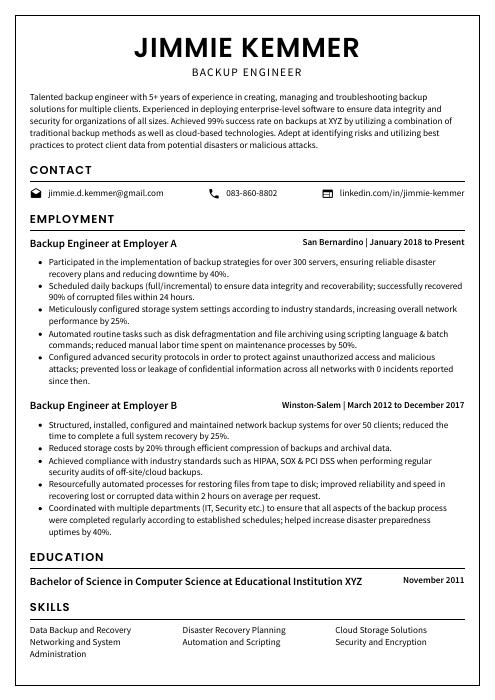 Cormorant
Cormorant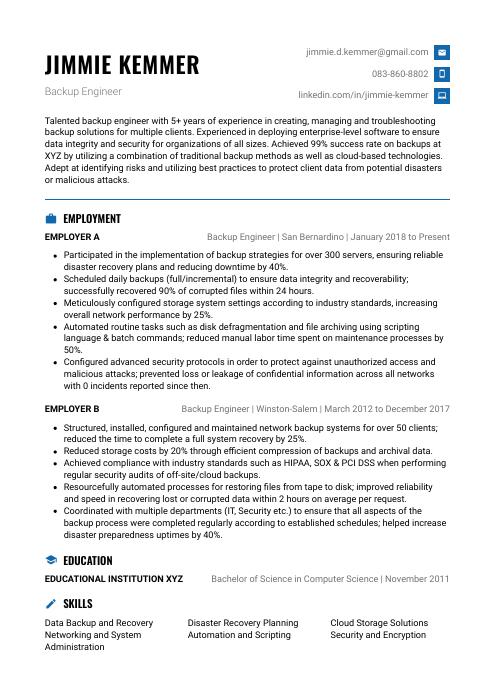 Echidna
Echidna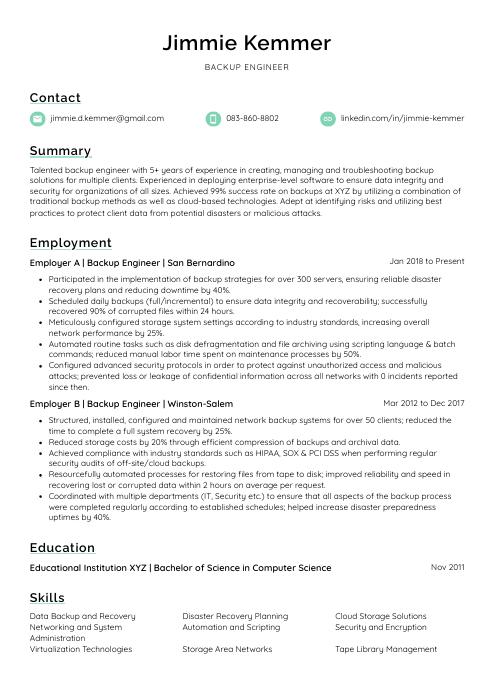 Lorikeet
Lorikeet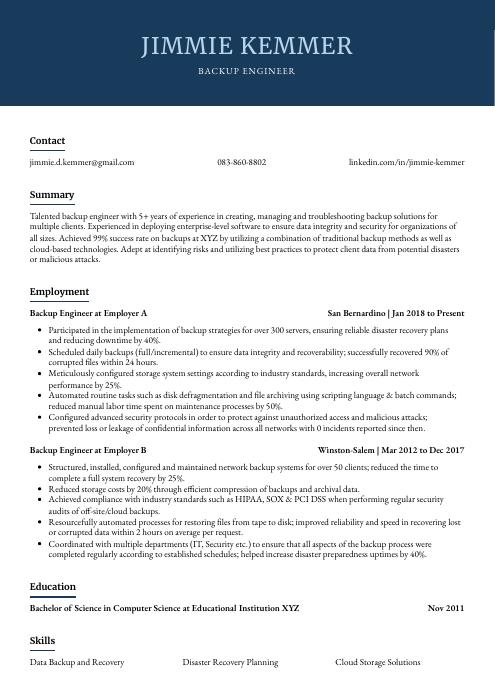 Bonobo
Bonobo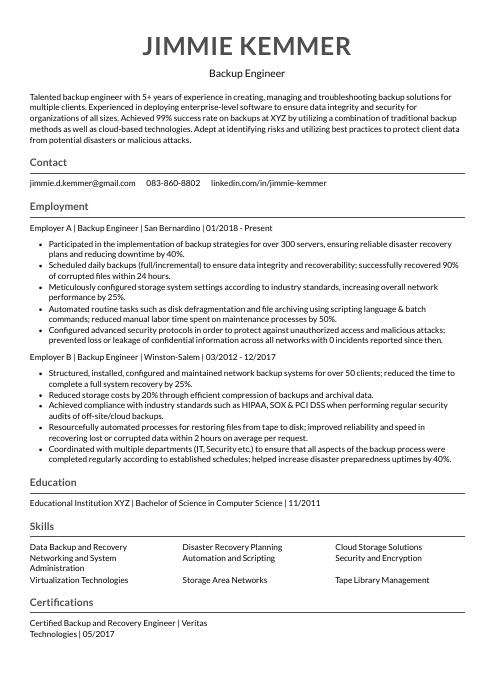 Indri
Indri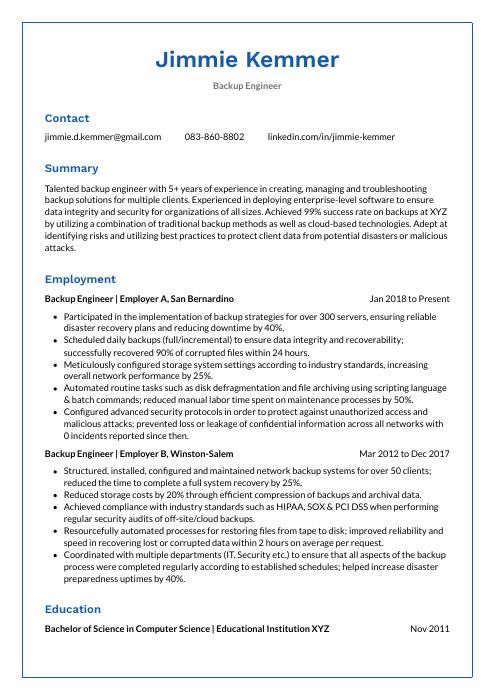 Markhor
Markhor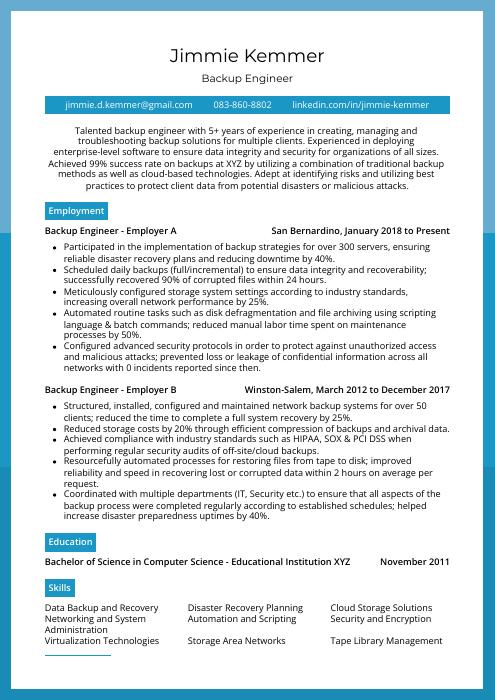 Rhea
Rhea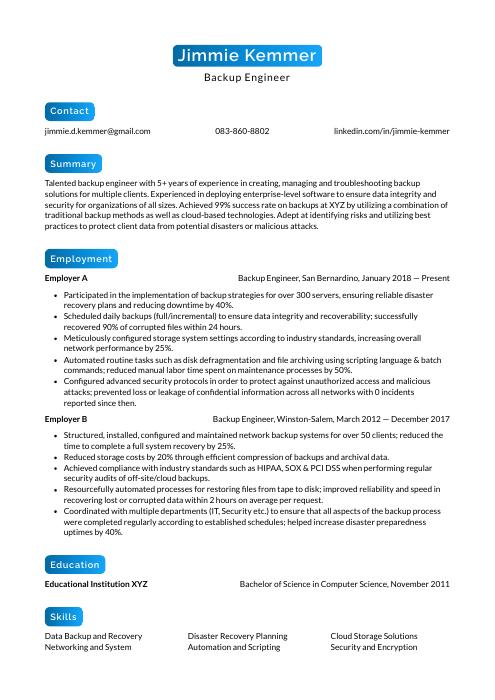 Kinkajou
Kinkajou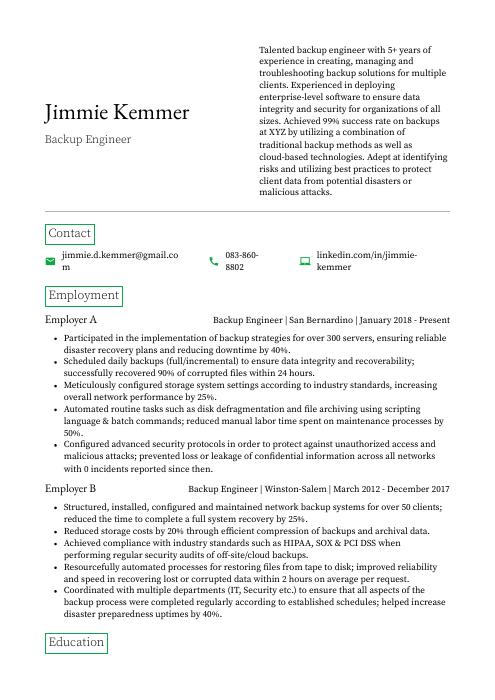 Quokka
Quokka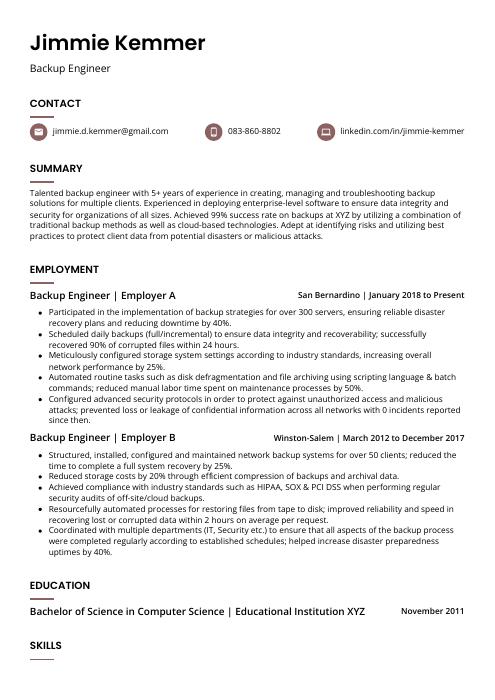 Fossa
Fossa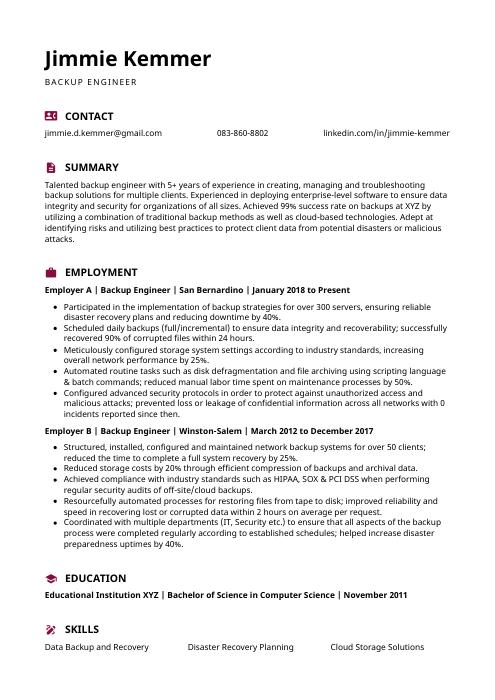 Hoopoe
Hoopoe Rezjumei
Rezjumei
